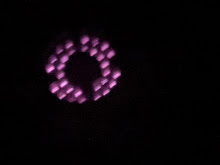I'm using a SanDisk 256MB CF for the OS, and once I got the hang of PXEboot (and gave up on the 4.3 snapshots), installing OpenBSD to flash was easy enough.
The trouble came when I went to mount an extra laptop SATA drive in the case. The mounting kit came without instructions, just an iron bracket, four screws, four brass standoffs:
The standoffs replace the screws that mount the motherboard to the case, but the four screws are too long -- I tried using them to hold the plate (bracket) to the standoffs, and the case top would no longer fit, the screw sticks up to far.
Tried tightening the screw the rest of the way down, and succeeded...
in breaking off the threaded part in the case!
The bottom of the brass standoff can be seen in the socket on the bottom of the case, so now there's nothing holding down that corner of the motherboard:
The screws are too long to use anywhere, they also don't work to hold the drive to the bracket, but at least I managed not to break one off in the drive too.
